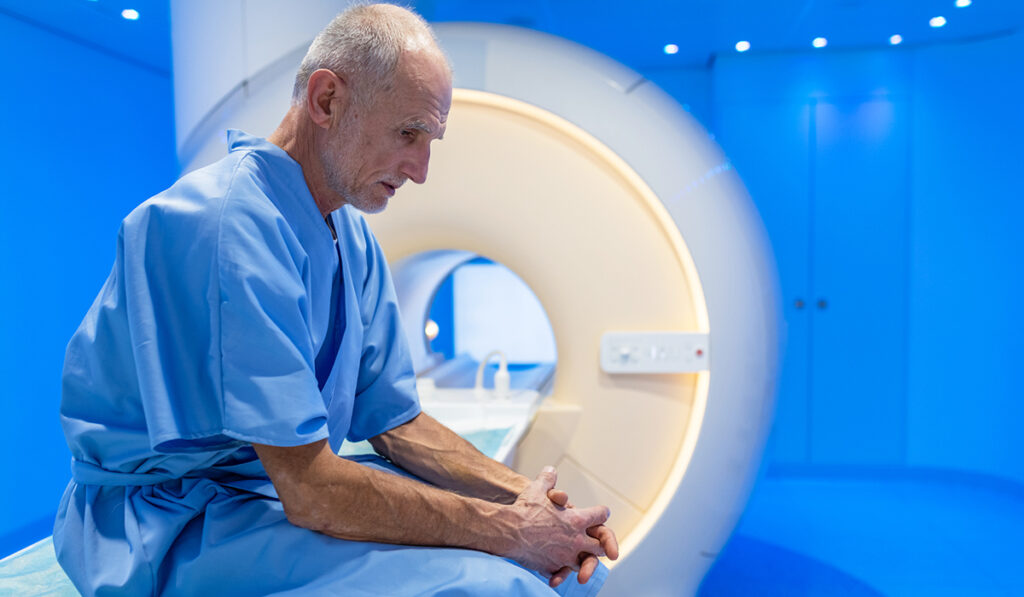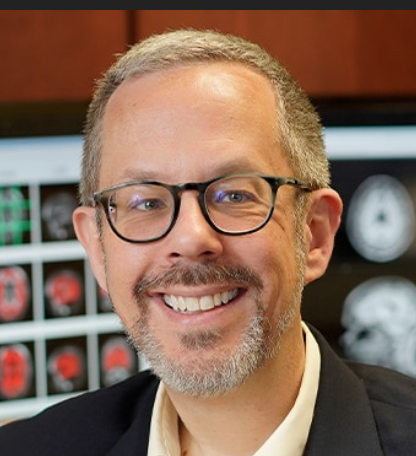With first-line drug success rates hovering at around 40 to 60 percent and relapse rates not far behind, antidepressants have been no universal panacea for treating depression.
Not only is their mechanism of action only partially understood, but it has been hard to determine the best medicines for individual patients. This can result in months or years of medication trials, leading to frustration, resignation and sometimes tragic outcomes.
After devoting the last 20 years to examining the clinical treatment of depression, Vanderbilt University Medical Center psychiatrist Warren Taylor, M.D., is convinced the medical community can do better. He is now exploring the brain’s functional networks – circuitry that propels our thinking and actions. Taylor is looking, in particular, at the circuitry’s response to depression medications and the durability of that response.
In a 2022 study, Taylor and his team focused on the development of late-life depression, using functional MRI (fMRI) to measure connectivity within and across key brain networks. They then followed the subjects’ symptomatic responses to escitalopram.
“Past studies have shown that network anomalies contributing to depression may also be very important in determining an individual’s level of response, and to what treatment,” Taylor said. “Consistent with this, we found that antidepressant responses are related to connectivity in the default network mode and in the cognitive control and limbic networks.”
Predictive Potential
Taylor is using this fMRI information, along with associated clinical symptoms, to predict not only the effectiveness of varying treatments and dosages, but also potential resistance to first- or second-line pharmacotherapy – even which patients are likely to relapse after remission.
Such stratification could also help characterize a treatment-resistant phenotype of people who may benefit from earlier intervention with third- or fourth-line pharmacological treatments, or with neuromodulation, including deep brain stimulation, transcranial magnetic stimulation or electroconvulsive therapy.
“Ultimately, we are working toward prescribing treatment that has predictive data behind it,” Taylor said.
Dysfunctional Brain Networks
Functional brain networks have garnered significant attention in epilepsy, where connectivity breaches have the acute, overt symptom of seizure. In neuropsychiatric illnesses, there is typically abnormal connectivity in certain circuits – some communicating too much, some too little, and some interacting although they shouldn’t be “talking,” Taylor said.
“In depression, low connectivity within certain key areas, including the cognitive control network, tends to be prevalent. This can lead to problems with attention or how we manage emotions,” he added. “In anxiety, there may be too much communication between centers: specifically, the amygdala – where feelings of fearfulness are generated – and the cognitive and executive-function areas.”
Covering multiple regions of the brain, the default mode network, which switches on when the brain is not otherwise actively engaged, can get stuck in negative rumination, Taylor said. This can underlie or aggravate existing anxiety and depression by having the effect of a recording repeating negative thought processes again and again.
Comparing fMRI Findings
Prior research in older adults indicates that brain-based interventions like antidepressants have the potential to disentangle problematic brain circuitry. Taylor and his group wanted to find out what circuit characteristics are tied to which late-life depression symptoms, as well as which circuits are involved in responding to the first line of treatment, selective serotonin reuptake inhibitors (SSRIs).
To do this, the researchers randomized 95 participants who were age 60 or older to either a study or placebo group, two-to-one. All had a Montgomery-Åsberg Depression Rating Scale scores of 15 or higher, signifying at least mild depression. They conducted resting state fMRI on all subjects, put the study group on a moderate dose of escitalopram, and followed participants’ clinical symptoms for eight weeks.
Each participant’s resting state functional connectivity was measured between key brain areas in the default mode and in the cognitive control and limbic networks. Depression symptoms, both before and after eight weeks of treatment, were catalogued.
After eight weeks, participants were offered an open trial of bupropion, a norepinephrine dopamine reuptake inhibitor.
Network Characteristics Identified
Post-treatment imaging was not performed, but correlations were found between pre- and post-treatment symptoms and network irregularities in people with different levels of depression, helping build a meaningful foundation for understanding likelihood of treatment response, Taylor said.
“Prior work has established that default mode and cognitive control networks can be altered through antidepressant treatment,” he said. “Now, we are demonstrating this in elders.”
In the open trial of bupropion that followed the eight-week fMRI trial, the researchers found isolated associations that mirrored those found with escitalopram, but Taylor says larger numbers are needed to draw firm conclusions.
Toward Personalized Treatment
Other work by Taylor’s group suggests that more than 50 percent of these older depressed participants who recovered would face a relapse within four years of the study.
“They may need other interventions to improve their symptoms and improve their quality of life. The sooner we know that for any given patient, the better we are able to target treatment for that patient,” he said. “Many people tend to do well over the long haul, but some people are more fragile in their response. The question we are trying to answer is, ‘How can we identify them and what can we do differently in treating them?’”





